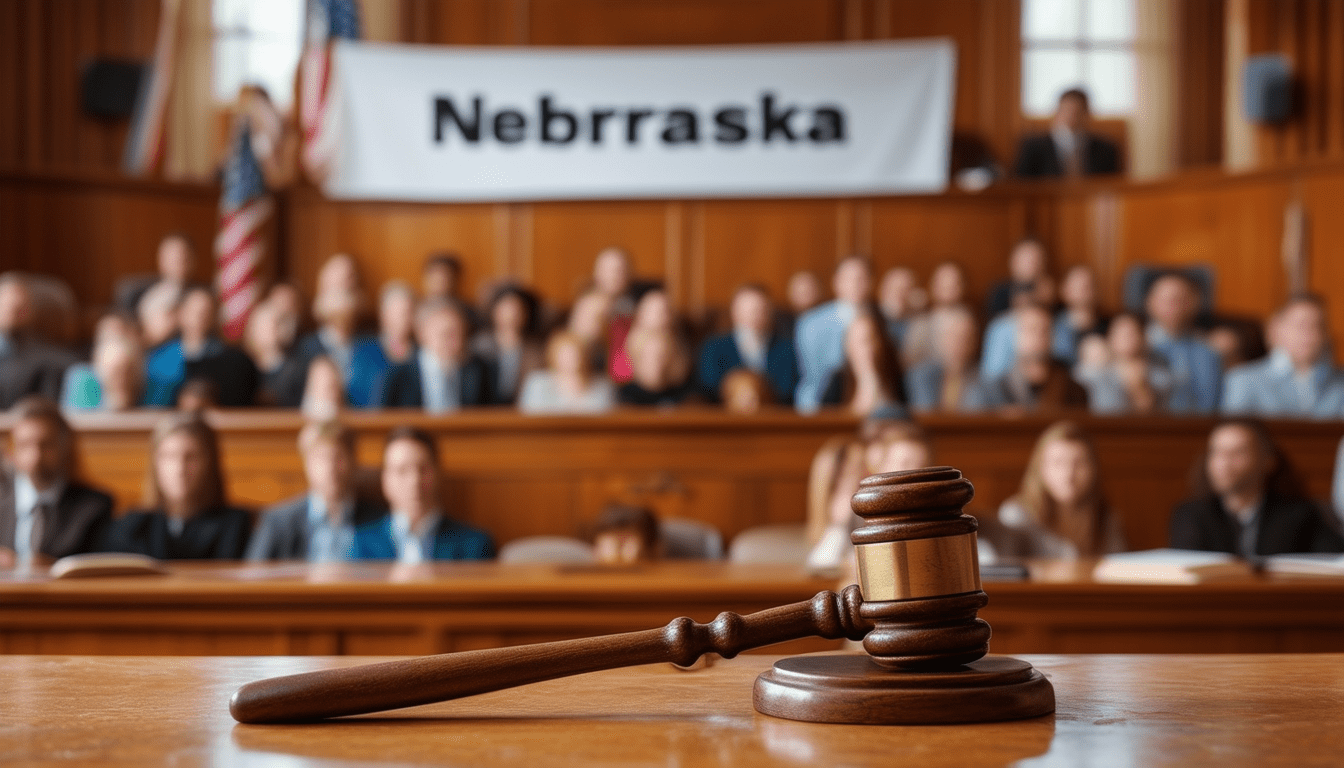Nebraska Medical Marijuana Signature Trial Concludes: Awaiting Judge’s Ruling on Ballot Measure Validity
|
IN BRIEF
|
The recent trial concerning the validity of Nebraska’s medical marijuana ballot measures has garnered significant attention as it unfolds in a legal arena filled with complexities. With arguments revolving around allegations of fraud and malfeasance in signature collection, the courtroom has witnessed starkly diverging narratives from the involved parties. Now, as the proceedings draw to a close, all eyes are focused on the forthcoming ruling from Judge Susan Strong. This decision holds the potential to impact not just the current medical cannabis initiatives but also the broader landscape of legal marijuana legislation in Nebraska.

The recent civil trial concerning the validity of medical marijuana ballot measures in Nebraska wrapped up, leaving a pivotal decision in the hands of Lancaster County District Judge Susan Strong. With final arguments delivered, the court will now deliberate on whether the signatures gathered for initiatives aimed at legalizing and regulating medical cannabis are valid or compromised. The outcome will critically impact Nebraska’s approach to medical marijuana and its legal landscape.
Diverse Perspectives on Legal Arguments
The concluding day of the trial saw attorneys representing opposing sides framing the matter in radically different lights. One camp asserted that perceived issues in the signature collection process were mere isolated incidents of “human error.” Conversely, the opposing side characterized these problems as widespread and indicative of “serious, intentional wrongdoing.” This divergence illustrates the high stakes involved, as each argument significantly influences public perception and judicial outcome.
The Status of the Ballot Measures
Despite the legal turmoil, the initiatives—Initiative Measure 437 focused on legalizing medical cannabis and Initiative Measure 438 aimed at regulating its sale—remained on the ballot for voters to decide. The court’s ruling will not come for at least two weeks post-trial, but the votes cast for these measures will still be counted, presenting a critical moment for proponents of medical marijuana in Nebraska.
The Nature of the Allegations
Legal representatives for former state senator John Kuehn positioned the debate not around the legitimacy of marijuana itself but rather the integrity of the processes employed to gather signatures. The assertion that “the ends justify the means” echoed through the courtroom, highlighting concerns that advocates’ zeal may have led to unethical practices.
Serious Accusations of Fraud
The prosecution, led by Deputy Solicitor General Zach Viglianco, painted a dire picture of “widespread, pervasive and serious” wrongdoings through the actions of those involved in the petition campaign. With claims that at least 80,000 signatures were problematic, the contention is that the integrity of the entire petition process is under threat from fraudulent activities.
Defense Arguments: The Case for Human Error
Attorneys for the ballot sponsors countered these claims by emphasizing that improper notarizations and alleged fraud should not taint the validity of all signatures collected. Daniel Gutman, representing the ballot sponsors, argued against the notion that isolated instances of misconduct could delegitimize the entire signature collection effort. He warned of the “potentially disastrous consequences” if the court accepted the broader implications of the prosecution’s arguments.
Eyewitness Testimonies and Their Impact
Witness testimonies added significant depth to the trial, with allegations of forgery and unethical behavior coming to light. A paid circulator recounted procedures that included forging signatures and falsely filling out information, leading to assertions of systemic fraud. These revelations underscore the complexity of the situation and the varying interpretations of the gathered evidence.
The Challenge of Proving Legitimacy
As the clock ticks down to a ruling, the case places tremendous pressure on both the defense and prosecution to substantiate their claims. The balance of ensuring electoral integrity against allowing voters a voice in medical cannabis legislation hangs in the balance. The court’s decision will likely set significant precedents for future initiatives and the interpretation of signature validity in Nebraska.
Next Steps and Anticipated Outcomes
The judge’s forthcoming decision will determine whether the ballot sponsors will be able to “cure” any challenges against signatures and what implications that holds for the broader public. Regardless of the outcome, the matter is expected to escalate to the Nebraska Supreme Court, regardless of who prevails at the district level. As voters await the decision, the implications for Nebraska’s medical marijuana landscape remain poised on a knife’s edge.
Comparison of Key Arguments in Nebraska Medical Marijuana Signature Trial
| Argument Type | Summary |
| Human Error | Defenders argue that mistakes are common and should not invalidate the entire petition. |
| Intentional Wrongdoing | Opponents claim that there were serious, deliberate infractions that undermine the campaign’s integrity. |
| Signature Validity | About 90,000 signatures were certified, but 80,000 signatures are under legal scrutiny. |
| Petition Circulator Fraud | Allegations of circulators forging signatures raise serious concerns about the legitimacy of the measures. |
| Judicial Oversight | Calls for the judiciary to act as a constitutional watchdog in validating the petition processes. |
| Evidence of Fraud | Prosecution presented multiple examples of improper notarizations suggesting widespread issues. |
| Consequences of Ruling | A ruling favoring the opposition could potentially disqualify the measures, impacting voter rights. |
| Potential for Appeal | No matter the outcome, the case is likely to be appealed to the Nebraska Supreme Court. |

The Nebraska Medical Marijuana Signature Trial has reached its conclusion after four days of contentious hearings. Attorneys from both sides have presented their arguments before Lancaster County District Judge Susan Strong, who will ultimately rule on the validity of the ballot measures aimed at legalizing medical marijuana in the state. The outcome is now in the hands of the court, with significant implications for the future of medical cannabis in Nebraska.
Conflicting Perspectives on the Case
During the trial, the attorneys expressed starkly different views on the significance of the alleged discrepancies related to the signature collection process. On one side, it was argued that irregularities were merely instances of “human error,” while the opposing counsel painted a picture of “serious, intentional wrongdoing” among campaign circulators. This divide highlights the contentious nature of the arguments surrounding the ballot measures Initiative Measure 437 and Initiative Measure 438.
Impacts on Ballot Measures
Despite the ongoing legal battles, the proposed measures to legalize medical cannabis and regulate its use will remain on the ballot for the upcoming election. Voters will have the opportunity to cast their votes on this critical issue, with results set to be published irrespective of the trial’s outcome. The public’s involvement underscores the democratic process and the importance of citizen input in legislative matters.
Legal Arguments Presented
As the trial unfolded, one attorney representing the plaintiffs asserted that the campaign for medical marijuana advocacy, while well-intentioned, strayed into questionable territory. It was suggested that the fervor for legalization led some individuals to believe that “the ends justify the means.” Conversely, defense attorneys contended that widespread misconduct was evident, thus undermining the legitimacy of the signatures collected.
Concerns Over Signature Validity
The case centers on a challenge to over 80,000 signatures, with critics alleging that instances of circulator fraud and notary malfeasance had pervaded the petition process. Despite the Nebraska Secretary of State certifying approximately 90,000 valid signatures on both initiatives, the ongoing scrutiny raises valid concerns about the trustworthiness of the collection methods employed. The AG’s office has submitted evidence in support of these claims, indicating improper notarizations that could invalidate numerous signatures.
Future Implications
The court’s eventual ruling will have far-reaching implications for not only the medical marijuana initiatives but also for the broader cannabis landscape within Nebraska. Should the court side with the challengers, it could disqualify substantial portions of the collected signatures, drastically reducing the chances of these measures passing in the current election cycle. However, if the court favors the sponsors, it may pave the way for a more favorable climate for medical cannabis regulation in the state.
Awaiting the Decision
As both parties prepare their post-trial briefs, the timeline for a decision from Judge Strong remains uncertain. The potential for an appeal to the Nebraska Supreme Court looms regardless of the outcome, indicating that this legal battle is far from over. Voter sentiment surrounding the proposed measures will undoubtedly continue to evolve as the situation develops.
If you want to understand more about the implications of this trial and its impact on medical marijuana legislation in Nebraska, visit here.
- Date of Conclusion: Monday marked the final day of the trial.
- Judge Involved: Lancaster County District Judge Susan Strong.
- Primary Focus: Legitimacy of two medical cannabis ballot measures.
- Ballot Measures: Initiative Measure 437 and Initiative Measure 438.
- Trial Duration: A total of four days of proceedings.
- Arguments Presented: Claims of “human error” vs. “serious, intentional wrongdoing.”
- Signature Verification: Over 80,000 signatures were challenged in the trial.
- Potential Outcomes: Judge to decide on disqualifying the measures or allowing them to proceed.
- Public Voting: Votes will still be counted despite legal challenges.
- Next Steps: Attorneys required to submit post-trial briefs by November 12.
Overview of the Nebraska Medical Marijuana Signature Trial
The Nebraska Medical Marijuana Signature Trial has recently concluded, with attorneys presenting their final arguments before Lancaster County District Judge Susan Strong. The crux of the matter revolves around the validity of two proposed ballot measures aimed at legalizing and regulating medical cannabis in the state. Following days of testimony and legal debates, a ruling is expected within two weeks, during which the judges will decide the fate of the initiatives that have garnered considerable public support.
Understanding the Legal Framework
To grasp the implications of this trial, it is essential to understand the legal framework surrounding ballot measures in Nebraska. The state requires a set number of valid signatures to advance any proposed initiative to the voting stage. In this trial, the defense argues that significant numbers of the signatures gathered for the medical marijuana initiatives are invalid due to claims of fraud and improper notarizations, while the sponsors assert that these challenges stem from isolated human errors rather than widespread malpractice.
Impact of Judicial Decisions
The impending decision by Judge Strong has substantial consequences not only for the future of medical marijuana in Nebraska but also for the integrity of the state’s electoral processes. If the judge sides with the challengers, it could set a precedent that allows for a broader interpretation of invalidating signatures based on alleged errors, which may deter future grassroots campaigns from attempting to leverage this democratic process.
Analysis of the Evidence Presented
The trial included testimony from various witnesses, some of whom have admitted to significant misconduct while collecting signatures. Each claim necessitates thorough examination to determine the extent of any wrongdoing. The testimony regarding intentional acts of fraud, as opposed to mistakes, will weigh heavily on the judge’s decision. Critics of the current legal exhibition emphasize the potential for judicial overreach into normal campaign practices based on a relatively small number of problematic cases.
Potential Consequences of Legal Misinterpretation
There are concerns regarding what some have described as potentially disastrous consequences should the court’s ruling favor the challengers. If the court categorizes the issues with notarization as grounds for invalidating the entire petition effort, it could have far-reaching effects on how future measures are assessed. This could lead to the disenfranchisement of many voters who support medical cannabis and heighten scrutiny of all grassroots campaigns.
The Role of Public Support in Legal Battles
Public sentiment plays a critical role in the unfolding trial. Numerous citizens have rallied behind the medical marijuana initiatives, reflecting a shift in public attitudes toward cannabis, especially concerning its medicinal uses. As the trial progresses, advocates emphasize that the desire for medical cannabis is a reflection of community needs rather than illicit desires.
Navigating the Political Landscape
The interplay between legal outcomes and political climate will also be crucial as the trial concludes. Nebraska’s legislators must consider whether to support the initiatives based on their public appeal or to allow judicial avenues to dictate the conversation on medical marijuana policy. The involvement of key political figures and advocacy groups signifies the importance of this issue’s resolution—beyond just legalities—it encapsulates broader discussions about health care and personal liberties in Nebraska.
Looking Ahead
The upcoming decision by Judge Strong promises to shape the future of medical marijuana policy in Nebraska significantly. Stakeholders on both sides must prepare for potential appeals and further legal wrangling, which could prolong the matter for the state. Observers will be watching closely, for not only will the decision impact this specific case, but it could also set crucial precedents for future ballot initiatives in the state.





Post Comment